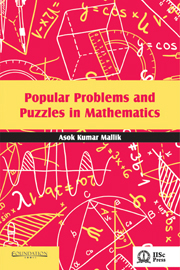Book contents
- Frontmatter
- Dedication
- Contents
- Preface
- Overview
- Problems
- Solutions
- Appendices
- Appendix I Linear Diophantine Equations in Two Unknowns
- Appendix II A Note on Private and Public Key: RSA Algorithm
- Appendix III Fibonacci Numbers, Golden Section, Golden Angle, Golden Rectangle and Golden Spiral
- Appendix IV Mathematics with Prime Numbers
- References
Appendix IV - Mathematics with Prime Numbers
from Appendices
Published online by Cambridge University Press: 05 October 2014
- Frontmatter
- Dedication
- Contents
- Preface
- Overview
- Problems
- Solutions
- Appendices
- Appendix I Linear Diophantine Equations in Two Unknowns
- Appendix II A Note on Private and Public Key: RSA Algorithm
- Appendix III Fibonacci Numbers, Golden Section, Golden Angle, Golden Rectangle and Golden Spiral
- Appendix IV Mathematics with Prime Numbers
- References
Summary
Prime numbers have continued to draw the attention of mathematicians for more than two millennia. In this Appendix, we present a brief overview of the type of questions that were raised and have been attempted to be answered. In the process, we mention some historically important theorems and conjectures concerning prime numbers. Proofs requiring advanced topics in mathematics have been omitted. Progress made so far in relation to yet unproven conjectures has also been discussed. Some interesting anecdotes and recreational mathematics in the history of prime numbers have been included. It may be mentioned that the use of prime numbers in the modern day computer cryptography and cryptanalysis, i.e., coding and decoding of secret information exchange, has already been discussed in Appendix II.
1. Introduction
For more than tow millennia, prime numbers have fascinated the greatest of mathematicians of every era. As we all know, prime numbers are those number, which have only trivial factors 1 and the numbers itself. The fundamental theorem of arithmetic says that all non-prime or composite numbers can be factorised in terms of prime numbers in a unique way (but for the order), as exemplified below:
18 = 2 × 3 × 3 = 3 × 2 × 3, etc.
Let us start with a list of some primes up to 1000:
2, 3, 5, 7, …, 23, 29, 31, 37, …, 769, 773, 787, 797, …, 821, 823, 827, 829, …, 977, 983, 991, 997
From the above list, it may be noticed that 2 is the only even prime, all other primes are odd. After 1859, mathematicians agreed to exclude 1 from the list of primes.
- Type
- Chapter
- Information
- Popular Problems and Puzzles in Mathematics , pp. 139 - 158Publisher: Foundation BooksPrint publication year: 2014



